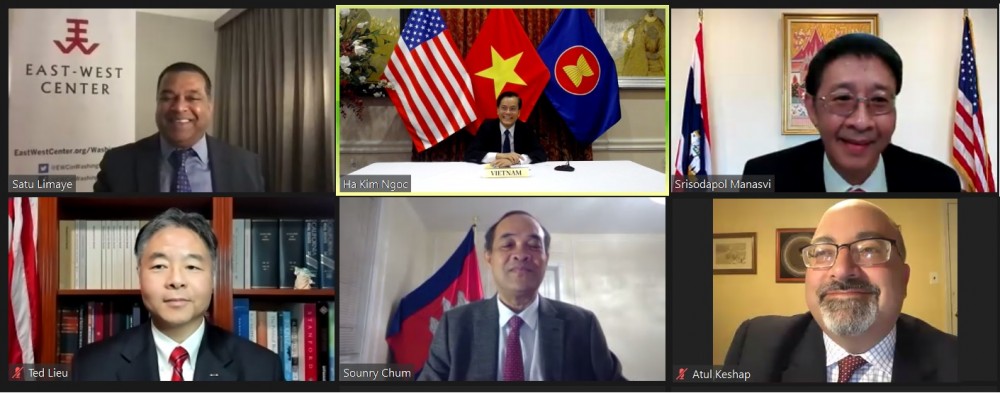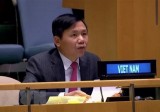US pledges to enhance cooperation with Mekong subregion’s countries
The US will bolster support for countries in the Mekong subregion through the Mekong-US partnership, US Principal Deputy Assistant Secretary of State for the Bureau of East Asian and Pacific Affairs Atul Keshap said at a recent online seminar to reveal results of a report on transboundary rivers and addressing challenges in Mekong River.

At the event
He said the support will focus on the management of transboundary water resources, regional economic connection, human resources development and response to non-traditional security challenges, including those in the health sector.
The report was based on outcomes of a virtual Indo-Pacific conference on enhancing management of transboundary rivers hosted by the East-West Centre last October.
Speakers at the event said that the Mekong subregion is facing challenges in security, development and climate change.
Keshap expressed the US’s concerns over impacts of hydropower dams in the Mekong River’s upper reaches on food security, economic development and environmental conditions of countries in lower reaches.
The US highly appreciates Vietnam’s efforts in pushing ASEAN’s cooperation to help the Mekong subregion cope with such challenges, he said.
Congressman Ted Lieu also affirmed that the US Congress wants the US government to further boost cooperation with the Mekong sub-region via the US-Mekong partnership. Since the launch of the Lower Mekong Initiative in 2009, the US has earmarked 3.5 billion USD for countries in Mekong River’s lower reaches.
At the event, Vietnamese Ambassador to the US Ha Kim Ngoc underscored the significance of water security, especially transboundary water resources, to peace and prosperity in the region.
Countries in the Mekong subregion share responsibilities for the use and management of Mekong River’s water resources in a sustainable manner in a bid to offset impacts on development and the environment, he added.
The diplomat affirmed that Vietnam is always a responsible member in joint efforts to cope with challenges in environmental issues, climate change, economic development and security in the Mekong subregion.
He proposed that countries work together to build regulations and legally binding frameworks to manage transboundary rivers.
He also called on the US and other partners to invest in the region in the spheres of energy, infrastructure, climate change adaptation and sustainable development./.
VNA
 Malaysia's digital economy projected to reach 31 billion USD in 2024
Malaysia's digital economy projected to reach 31 billion USD in 2024
 Opportunity to enhance the position of the Global South
Opportunity to enhance the position of the Global South
 Thailand to build new bridge to Cambodia
Thailand to build new bridge to Cambodia
 Bulgaria charts new course with Vietnam on President’s upcoming visit: Diplomat
Bulgaria charts new course with Vietnam on President’s upcoming visit: Diplomat
 Seminar seeks ways to boost ASEAN - Latin America connectivity
Seminar seeks ways to boost ASEAN - Latin America connectivity
 Indonesia seeks India's help in health education
Indonesia seeks India's help in health education
 Indonesia named world's most generous country in 2024
Indonesia named world's most generous country in 2024
 Philippines: Over-4m-high floodwaters make thousands of houses submerged
Philippines: Over-4m-high floodwaters make thousands of houses submerged
 Singapore’s public sector records carbon reduction in 2023
Singapore’s public sector records carbon reduction in 2023
 Pressure facing the EU on its growth track
Pressure facing the EU on its growth track



